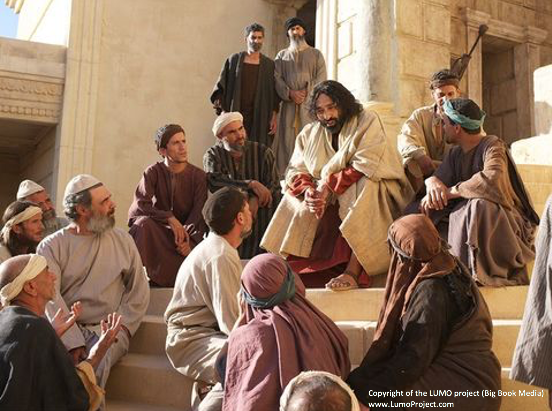“But I know Him, for I am from Him, and He sent Me.” John 7:29
In his book Grace Walk, Steve McVey writes: “When I was a student in high school, a hypnotist came to our science class. He brought four students to the front of the room and hypnotized them together. While they were in a trance he told them that when they woke up, they would each be an animal. One boy was told that he would be a monkey. Another would wake up as a dog. One girl would be a chicken and the other a turkey. The hypnotist said, ‘I will count to five and snap my fingers, and when I do you will wake up.’ He slowly counted to five, snapped his fingers, and they woke up like he had said.
“What happened next was quite a sight. They behaved exactly like the animals they had been told they would become. One hopped around all stooped over, with his hands swinging by his sides like a monkey. He jumped up on a desk and screeched like a Cheetah. The other boy started barking and running around the room like a dog. The first girl folded her hands under her arms and clucked as if she was trying to lay eggs. The other started around like a turkey, gobbling as aloud as she could and scratching at the floor with both hands. It was a comical sight to see people act like the animals they thought they were. After a while the hypnotist woke them up and let them come back to their real identities. You can imagine how embarrassed they were when we told them how they had behaved.
“Many Christians behave in ways they don’t understand. They want to be saints, but most of the time it seems that living like saints demands too much effort and attention. It is usually much easier just to ‘be yourself.’ That thought raises an important question. Who are you? … If we believe we are a dog, nothing can keep us from barking. If we believe we are a monkey, all the evidence in the world can’t make us behave like anything else. Through the power of suggestion many Christians have been deceived into believing that they are something other than what God has made them to be. Jesus said, ‘The truth will set you free.’ Our identity in Christ is one of the most liberating truths we will ever understand.” (Steve McVey, Grace Walk: What You’ve Always Wanted in the Christian Life [Eugene, Oregon: Harvest House Publishers, 2005], pp. 41-42).
We are going to answer two questions that are raised in John 7:25-36: Who are you and where are you going? In this article, we will look at who you are by focusing on … THE QUESTION OF JESUS’ IDENTITY (John 7:25-31). The people Jesus was speaking to in the temple were confused about His identity. “Now some of them from Jerusalem said, ‘Is this not He whom they seek to kill?’ ” (John 7:25). Some of the residents of Jerusalem heard a nasty rumor about the religious leaders’ plan to kill Jesus. Their question expects a negative answer: “This can’t be the guy they are seeking to kill, is it? Afterall – “But look! He speaks boldly, and they say nothing to Him. Do the rulers know indeed that this is truly the Christ?” (John 7:26). The crowd was impressed with Jesus’ courage to speak openly despite the plan to kill Him.
The people were wondering if perhaps the reason why the religious leaders had not sought to kill Jesus yet was because they had recognized Jesus to be the Messiah-God. “However, we know where this Man is from; but when the Christ comes, no one knows where He is from.” (John 7:27). The crowd doubted Jesus’ identity as the Messiah because they could trace His origin from Nazareth in Galilee. Some of the Jerusalem residents held to a tradition which said that the origin of the Messiah would be unknown. But this was a smokescreen to avoid the obvious facts about Christ.
We live in a culture today that is very confused about the identity of Jesus Christ. According to Mormonism, Jesus Christ is a self-progressing deity who was created through procreation between the male and female earth gods. Jehovah Witnesses claim that Jesus was a created being who pre-existed as the angel Michael and then was changed into the mortal man Jesus. The Iglesia Ni Cristo cult in the Philippines believes Jesus was created by God the Father and is His highest creation, but He is not God. Many of today’s world religions such as Islam, Hinduism, and Buddhism view Jesus as either a prophet or a good moral teacher, but not God Himself. So the confusion that existed in John’s day still exists today. But when Jesus speaks, the confusion turns into clarity.
“Then Jesus cried out, as He taught in the temple, saying, ‘You both know Me, and you know where I am from; and I have not come of Myself, but He who sent Me is true, whom you do not know.’” (John 7:28). “So you know Me and where I am from, do you?” They knew He was from Nazareth but they didn’t know the more important sense of where He was from. Jesus was sent on a mission by the One who is true, His Father Whom the crowd did not know. If they knew the Father, they would know the One whom the Father sent. Jesus continues, “But I know Him, for I am from Him, and He sent Me.” (John 7:29).But Jesus knew the Father because He has always been from Him – He was with Him from eternity past. Christ was sent by the Father to show people what God is like and to save them from their sins. We see from this that Christ’s claim to be the eternal Son of God calls for a response.
Some of the crowd rejected Christ. “Therefore they sought to take Him; but no one laid a hand on Him, because His hour had not yet come.” (John 7:30). They sought to arrest Jesus because He claimed to be the Son of God but they could not touch Him because it was not God’s time for His Son to be crucified. The time of every man’s death has been fixed by God and no one can interfere with that (cf. Psalm 139:16). “And many of the people believed in Him and said, ‘When the Christ comes, will He do more signs than these which this Man has done?’ ” (John 7:31). Their question expects a negative answer. In other words, they could not imagine that the prophesied Messiah would do more miraculous signs than Jesus had done. Hence, they were persuaded to believe in Jesus as the Christ because of the miracles He had done (cf. John 5:36; 10:25, 38; 14:10-11; 20:31).
So we see that Jesus knows who He is – the eternal Son of God sent by His Father to save mankind. Knowing who He is resulted in great boldness before a mixed audience (John 7:26). But what about you? How would you answer the question, “Who are you?” You might tell us your name, but if I asked you to tell me about yourself, what would you say then? If you are like most people, you will tell me what you do. “I am a student, an electrician, a construction worker, a customer service representative, a teacher, or a pastor.” You have sought value through your title or position.
Or you may say, “I drive a BMW or I own a $500,000 home.” Perhaps you have new stylish clothes thinking that these possessions will add to your importance. Or you may be a “name dropper” because you think that having an association with someone who is successful or famous will increase the value of who you are. Some of us may seek validation from our appearance. So we go to the fitness center to gain the “right” body image to increase our attractiveness thinking that it will give us a new level of importance.
Another common way we may try to establish our value based on performance is through our skills. In our American culture, we idolize actors, athletes, and musicians because of their skills. We believe that if we are great at doing something, it will increase our value. This also applies to mental abilities. We are convinced that if we are mentally gifted, people will admire us more. So we try to get the best test scores in school or demonstrate greater mental skills on the job to get a promotion. This area breeds perfectionism. Mistakes are not okay because they reveal weaknesses and bring shame on us.
We have been programmed to think of identity as inseparable from behavior. We have been taught that our value is based on what we do rather than who we are. Most people believe the lie that says, “I am what I do.”
But listen – God doesn’t look at it that way. God determines identity by birth, not behavior. “Blessed be the God and Father of our Lord Jesus Christ, who according to His abundant mercy has begotten us again to a living hope through the resurrection of Jesus Christ from the dead … having been born again, not of corruptible seed but incorruptible, through the word of God which lives and abides forever.” (1 Peter 1:3, 23). A person born into the family of God by faith in Christ (John 1:12) receives a new identity: “Therefore, if anyone is in Christ, he is a new creation; old things have passed away; behold, all things have become new.” (2 Corinthians 5:17). When you believe in Christ alone for His gift of salvation, you become a new creation. God created a new person when you were saved. You are not the same person you were before you became a Christian. When you were born into the family of God, you received the following family traits:
YOU ARE FULLY ACCEPTED BY GOD. The Bible says, “To the praise of the glory of His grace, by which He has made us accepted in the Beloved.” (Ephesians 1:6). It is difficult to warm up to someone if you think they don’t accept you, isn’t it? It is hard to have an intimate relationship with someone if you perceive they don’t like you. But because Christ has received you and He is fully accepted by the Father, you are fully accepted by God as well. You are totally accepted by God because you are “in the Beloved,” Jesus Christ. You don’t need to change a thing about yourself for God to accept you. Your acceptance by God is not based on what you do, but on who you are in Christ. You no longer need to withhold your true self from others. You are free to express who you are without shame.
YOU ARE GOD’S WORK OF ART. “For we are His workmanship, created in Christ Jesus for good works, which God prepared beforehand that we should walk in them.” (Ephesians 2:10). The word “workmanship” is the Greek word poiēma from which we get our English word “poem.” A poem is a collection of words that are specially chosen and put together so that they make a powerful statement that lasts. God is saying that you are His heavenly poem—you have been specially created by God to make a powerful statement about His grace that endures forever. You used to be defined by sin and shame, but now you are defined by being “in Christ.” And God sees in you holiness… beauty… and goodness. Everything He sees in Jesus Christ He now sees in you. You may see yourself as this person who has failed or who lacks certain abilities, but God sees you as His heavenly work of art – His masterpiece!!!
YOU ARE AN AMBASSADOR. “Now then, we are ambassadors for Christ, as though God were pleading through us: we implore you on Christ’s behalf, be reconciled to God.” (2 Corinthians 5:20). What is an ambassador? The highest ranking diplomatic representative appointed by one country or government to represent it in another country. When you become a Christian, you also become God’s representative here on earth. You are on this planet representing the King of kings and Lord of lords. This a great honor to be appointed this position. The more you see yourself as Christ’s ambassador, the more of His boldness you will have in living and speaking for Him. You represent the most powerful and important Person in the universe. He has your back (cf. Joshua 1:9; 2 Chronicles 20:15, 17; Psalm 118:6-7; Isaiah 41:10; Matthew 28:20).
But you may be thinking, “I don’t feel accepted by God. I don’t see myself as a heavenly poem. I don’t behave like an ambassador for Christ.” I can understand this. But we must decide whether we will trust what we feel and think or what God has said in His Word. Satan has caused many Christians to believe that they are not really new persons in Christ. He tells them they should try to act like new creations because that is their Christian duty. But God says you are a new creation. When you come to believe that fact by faith, you won’t feel the need to act. You can just be yourself, allowing Christ in you to flow through your personality and out of your life.
You may wonder, “Why don’t I act like who I am?” Remember the people who acted like animals when they were hypnotized? They acted that way because they temporarily believed a lie about their identity. When they were brought out of the hypnotic trance and understood reality, they began to behave like the people they really were.
Why do people who are holy act unholy? Why do many believers struggle with sins, constantly trying to overcome them? Because Satan has deceived them into believing they are the same persons they were before they came to Christ. And we act in the way we perceive ourselves to be. “For as he thinks in his heart, so is he.” (Proverbs 23:7). Satan, the great deceiver, has caused us to believe that at the core of our being, we are nothing more than rotten sinners. That describes what we were before we were saved, but not anymore!
If the hypnotist had been able to keep those four students believing his suggestion, they would still be barking, cackling, gobbling, and screeching! But they did wake up to the truth. That’s what needs to happen to many Christians today!
Have you been hypnotized to live under a false identity, so that you see yourself as nothing more than a saved sinner trying to serve God? Let this truth wake you up! You are not just a sinner saved by grace. You are a saint who has the life of Christ at the center of your being. A sinner saved by grace spends his time on the defensive against Satan. Someone who knows he is a saint goes on the offensive.
When those four hypnotized students woke up and realized how they had behaved, they felt pretty silly. That pictures the attitude of believers who wake up to their true identity in Christ. They will sometimes lapse into old patterns of living and will choose to sin. But when they do, they know that their behavior is inconsistent with who they are in Christ. And it won’t be long until they open their eyes and realize, “It’s ridiculous for me to behave this way!”
Prayer: Father God, so much of my life has been driven by shame. I have sought to hide or even numb my shame through my performance. I am realizing, that apart from the gospel of Jesus Christ, I cannot break free from shame. None of us can. Thank You, Father, for changing me from a sinner into a saint the moment I believed in Jesus for His gift of eternal life. I am not the same person I used to be. But Satan keeps trying to deceive me into believing I have not changed. Please renew my mind about who I am in Christ. The more I see myself as You see me, the more I will live in a way that is consistent with who I am in Jesus. I want to speak boldly about Jesus just as He did in the temple in front of a mixed audience. Father, help me see myself as You do so Christ’s boldness will flow through me and people will come to faith in Him. In His powerful name I pray. Amen.










